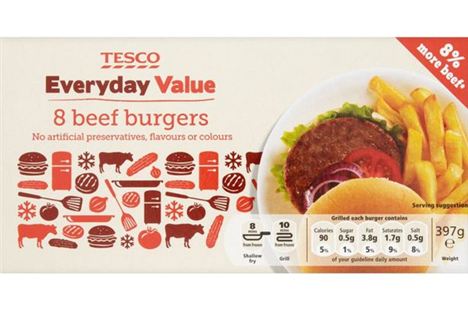MUCH has been written, tweeted and discussed in the media in recent weeks over the scandal of traces of horse meat in supermarket burgers. In fact the original reports also stated pig DNA was found in many of the samples tested, which is of concern to anyone who avoids pork for religious reasons. However, this information has been eclipsed by the shock-horror potential of the thought that we may be eating horse.
When a packet of 'value' burgers costs as little as £1, perhaps we shouldn't really be surprised to discover that the meat is bulked out with other ingredients, but the packaging, to my mind, is very misleading.
In fact, nutritionally, it’s quite a healthy option: it's leaner than beef, has higher levels of omega 3 and 6 'essential fats' and is enjoyed in several countries around the world, including our close neighbours (no pun intended) in France. One enterprising chef regularly serves up horse meat in his restaurant in Scotland. Yet even though we’re happy to use it in dog food, British sensibilities mean for the majority, the idea of eating 'Black Beauty' makes us wince.
For me, the far bigger issue is not that there was horsemeat or traces of pig meat in the burgers, but that it wasn't what the label claimed it to be. If you avoid certain foods for cultural, ethical or religious reasons or if you suffer from food allergies, it is crucial that food is correctly labelled.
 Several countries around the world enjoy horse meat
Several countries around the world enjoy horse meat
But even if you don't fall into any of these groups, it still seems reasonable to expect that what you are eating is what it says it is on the packet. However, in today's world of processed foods where ingredients may come from a wide variety of different locations, including other countries where standards and practices may differ from ours and costs are ratcheted down and down, it’s increasingly likely that what you buy may not be quite what you think it is. Interestingly, the DNA testing that identified the presence of horse and pig in beef burgers has, up until now, not usually been done in this country so for all we know, we could be eating unidentified proteins in even more processed foods.
In the fall-out since the scandal first surfaced, a number of revealing articles have appeared, delving beneath the glossy exterior of processed foods. Call me naive, but if I were making a beef burger, I would make it from minced beef and not much else; you can add herbs and spices, perhaps a little chopped onion and maybe some egg to help it bind together but that's it! However, the world of supermarket burgers is a little more complicated.
 Value burgers: Food for thought?
Value burgers: Food for thought?
To begin with, according to the BBC website, there are two classifications for burgers in this country: standard and economy. A standard burger must have a minimum of 62 per cent beef (that's still 38 per cent, more than a third, 'other stuff') whereas an economy burger only needs to be 47 per cent (less than half!) beef. Other ingredients include things such as 'soya protein isolate' , beef fat, sugar (it gets everywhere!), water, flour, 'rusk', and various chemicals, such as 'stabilisers' and flavourings.
Of course, when a packet of 'value' burgers costs as little as £1, perhaps we shouldn't really be surprised to discover that the meat is bulked out with other ingredients, but the packaging, to my mind, is very misleading. Pictures of juicy-looking patties on a bed of salad and banners claiming '8 per cent more beef' or 'free from artificial preservatives, flavours and colours' give the subliminal impression that what you are getting is a quality product at a bargain price.
Perhaps what we should be learning from this is two-fold:
- The closer you are to the source of the food, the less likely it is to be mucked about with (so use your local butcher and get cooking)
- If a price looks too good be true....it probably is!
The advice given here is not intended to replace medical advice. Always consult your GP if you are concerned about your health.
Clare Jones, BA(Hons), Dip ION, mBANT NTC & CNHC registered
Nutritional Therapy 07985 166606.
If you would like to make an appointment for a personal nutrition consultation with Clare, please contact her on the above number or visit Clare’s website: www.clarejones-nutrition.co.uk
Follow Clare on Twitter @ClareJonesNutri and Facebook www.facebook.com/ClareJonesNutritionalTherapy










